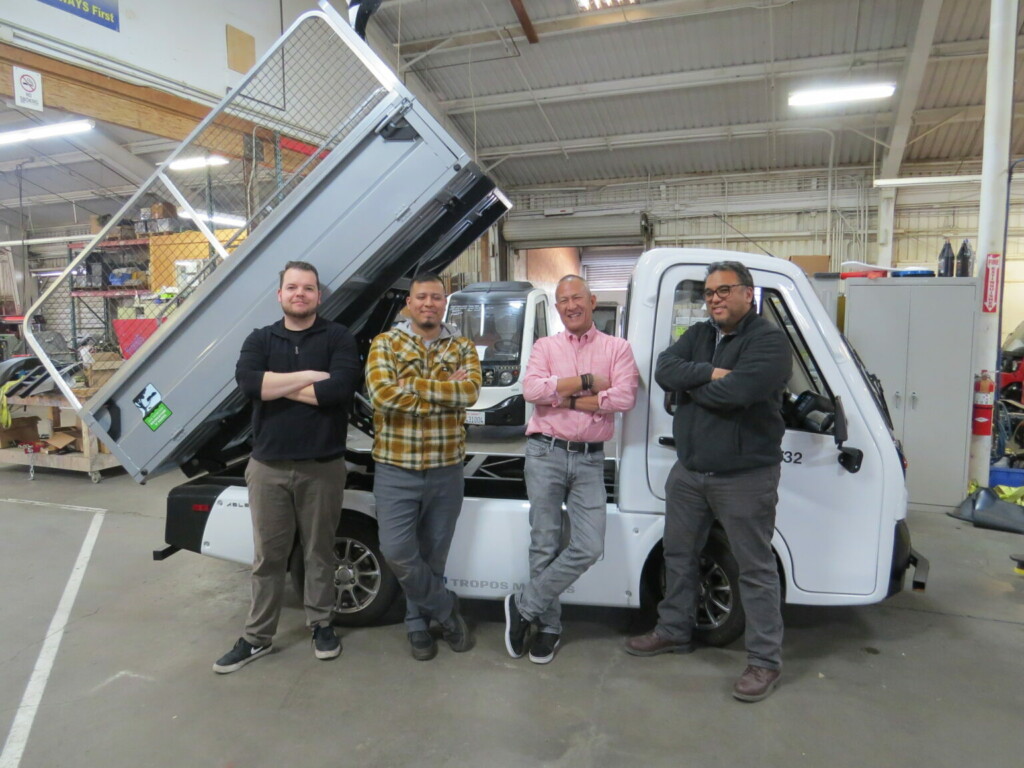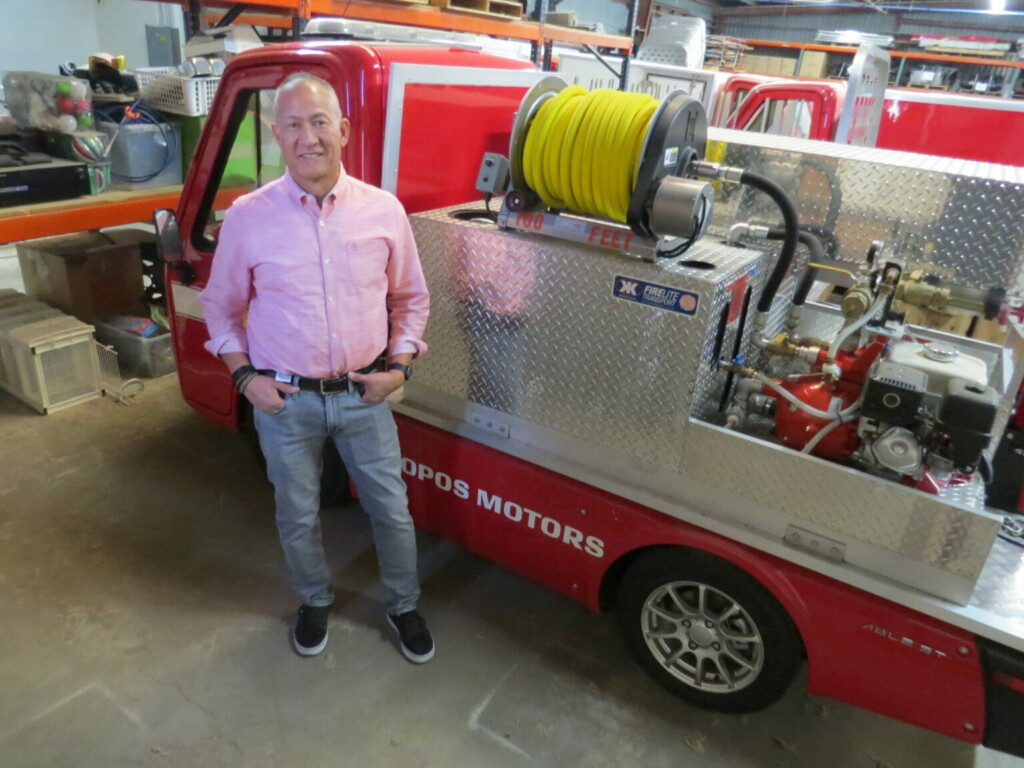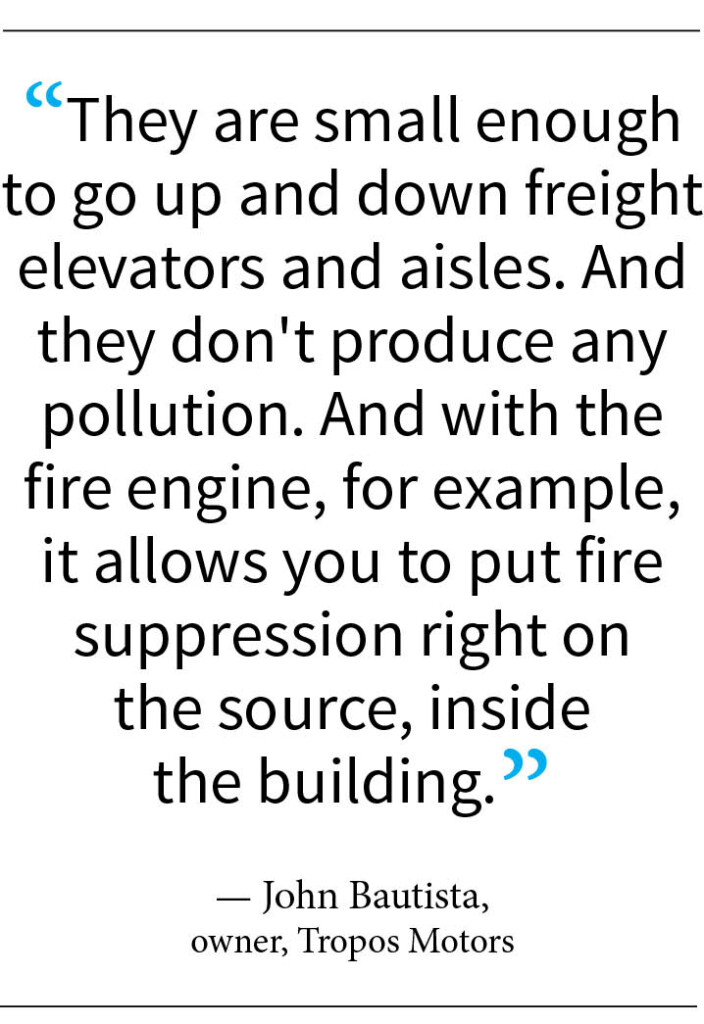Tropos: Firm attacks the commercial vehicle industry with innovation
Morgan Hill’s Tropos Motors sells small, modular electric vehicles to Stanford and other universities
![]()

Photo by Calvin Nuttall
From left to right, Isaac Berlinski, Michael Lujan, John Bautista, and Romeo Dichoso with Tropos Motors, which is innovating the commercial utility vehicle industry.
By Calvin Nuttall
One block from downtown Morgan Hill on Church Street, hidden in a nondescript factory behind a cyclone fence, Tropos Motors is quietly innovating the commercial utility vehicle industry. These small electric trucks may not be sleek status symbols like Teslas, but they don’t need to be sexy to sell.
 John Bautista is the founder and CEO of Tropos. He launched the company in 2017.
John Bautista is the founder and CEO of Tropos. He launched the company in 2017.
“I saw the commercial utility market, and I saw that it was underserved,” he said. “The brands that existed there had been doing it for decades, and they were using old technology. As far as they were concerned, it was good enough. I saw an opportunity to do something more. That is where the Tropos Able Platform was born.”
Tropos trucks are designed to be modular. They easily switch between configurations. When they were first introduced, there were five available: a trades vehicle equipped with a ladder rack and toolbox, a fire engine, a street sweeper, and two types of ambulances. The kit could be switched out by two technicians in about 15 minutes. Their latest line of vehicles comes in roughly 25 configurations and is even faster to convert.
“These are packages that nobody had thought of putting on this type of vehicle,” Bautista said. “We thought it would resonate with the industry because you can buy one chassis and a bunch of different packages and just mix and match whatever you want. It’s even more modular now. You bring a forklift in, it releases the bed, you take it off and put the new one back on, and it takes about two minutes.”
A self-described “gearhead,” Bautista has been in the business of building and modifying vehicles for more than 20 years. Before getting into the electric vehicles market, he built custom motorcycles, or “choppers.” In 2003, he was invited to bring his bikes to showcase them at an event. There he met the founder of Zero Motorcycles, an electric motorcycle manufacturer. Two weeks later, he found himself at the head of their engineering department. After working at a few more companies, he decided to found his own firm.
Fast forward five years, and Tropos is beginning its fourth generation of vehicles. They have sold roughly a thousand trucks. Their customers include universities and high-tech manufacturers, organizations that need small, nimble vehicles that can traverse sidewalks and navigate around buildings and inside warehouses.
 “They are small enough to go up and down freight elevators and aisles,” he said. “And they don’t produce any pollution. With the fire engine, for example, it allows you to put fire suppression right on the source, inside the building.”
“They are small enough to go up and down freight elevators and aisles,” he said. “And they don’t produce any pollution. With the fire engine, for example, it allows you to put fire suppression right on the source, inside the building.”
Bautista describes his business philosophy as “efficiency at all levels.” Tropos has only 17 employees.
“I’ve been in too many startups where they try to build an empire,” he said. “If I can leverage our partners, I do. For example, we don’t design the payload package, like the fire unit. I don’t want to be an expert on fire apparati. So, why not partner with somebody who is already an authority in that field? They’ll have a quicker solution — and something that is going to be stable and high-quality.”
In a similar way, Tropos leans on its partners for manufacturing, with 70 percent of assembly outsourced to Bulgaria with Workhorse, an Indiana-based company that makes larger commercial electric trucks. The partially-assembled vehicles are then shipped to Morgan Hill. Here, Tropos employees produce the finished truck.
“The reason is, they (Workhorse) have more facilities and capacity,” Bautista said. “Here, if I tried to build that capacity, it would cost me a lot more. Labor is highly competitive here. Land, lease space, taxes and everything else. It is expensive to do business here.”
Through such partnerships, Tropos remains “capital-light,” as Bautista puts it, while doing business with major customers such as Stanford University and the University of California in Berkeley and the University of California, Los Angeles.
“I don’t have to invest in the infrastructure,” he said. “I don’t have to put up a building, I don’t have to pay all the capital expenses, training people, managing people. All of that takes time and resources. If I can pay incrementally for that, the bottom line is, I don’t have to get my hands dirty. That is why we have so few employees.”
Bautista expects the business to grow substantially in the near future. He predicts Tropos will sell a thousand more vehicles in the next year alone, as many as they have sold to date.
Click HERE to view a short video of Tropos trucks conversion
 “Ultimately the goal is to increase the amount of manufacturing we do here stateside,” he said. “But you have to get to a certain level, so you can automate a fair portion of what you’re doing, so the labor costs are less impactful.”
“Ultimately the goal is to increase the amount of manufacturing we do here stateside,” he said. “But you have to get to a certain level, so you can automate a fair portion of what you’re doing, so the labor costs are less impactful.”
Reflecting back on the progress his company has made in the past five years, Bautista admitted that, in the mad rush of modern business, it has been difficult to stop and appreciate how far Tropos has come in such a short time.
“It’s hard when you’re in the thick of it,” he said. “It’s difficult when you see the next challenge in front of you to say, ‘Hey, wow this is really cool,’ you know? It’s hard to step back, to stop and smell the flowers.”
